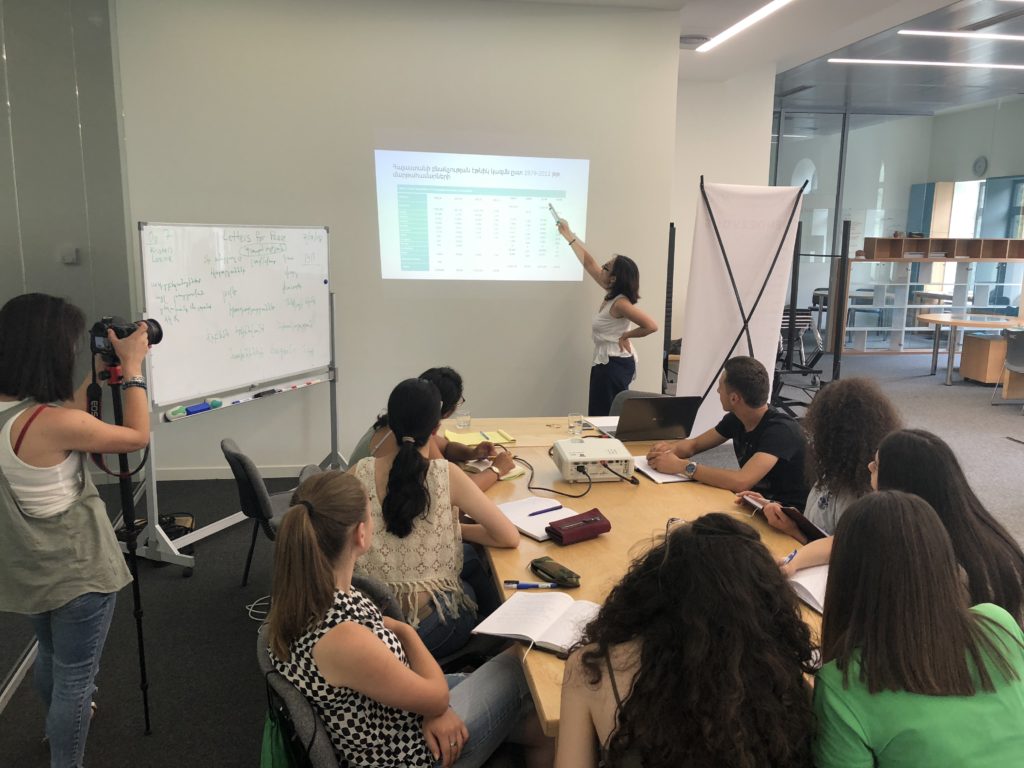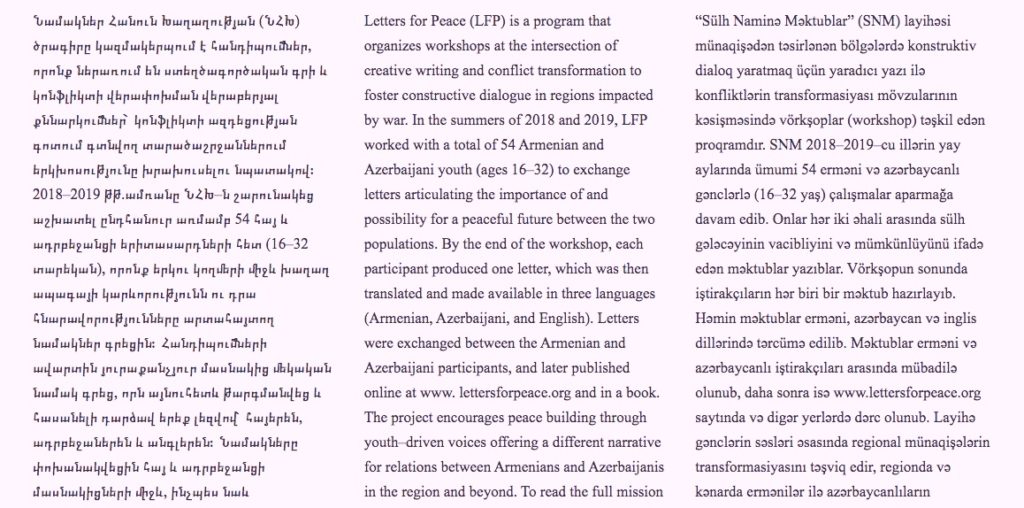An epistolary quest for peace
Interview with Raffi Wartanian
Mashallah News speaks to Raffi Wartanian, a writing instructor at Colombia University, and the initiator of the Letters for Peace project bringing together youth from Azerbaijan and Armenia.
When war between Azerbaijan and Armenia over Nagorno-Karabagh broke out last September, Raffi Wartanian was in New York. The conflict brought back painful memories of the first war (1988-1994) between the two countries, and of the Armenian Genocide, which his grandparents and great-grandparents escaped more than one century ago to take refuge in Lebanon.
Almost at the same time, Wartanian was giving the final touches to his Letters for Peace project with the publication of a book compiling personal correspondence between Armenian and Azerbaijani youth over the course of two years.
Voices advocating for peace were marginalised and silenced in both societies, and the release of the book was overshadowed as fighting intensified. On November 9 of last year, a ceasefire was brokered under the pressure of Russia, which also sent around 2,000 soldiers on the ground as a peacekeeping force.
As was the case before the war, direct contacts between Armenians and Azerbaijanis are now almost non-existent. In this interview with Mashallah News, Raffi Wartanian – a versatile artist and writing instructor at Columbia University – speaks about the genesis, meaning and future of the Letters for Peace project.

What was the initial idea for Letters for Peace?
It started in 2017 when I was co-teaching a creative writing workshop at Rikers Island jail in New York City. Rikers is notorious for being a challenging environment for people who are incarcerated. But when we went there to teach our workshops, the participants were very excited. They had much to say and it was apparent that the workshops represented an opportunity to create meaning out of their experiences. For me, this was a new insight. A writing workshop can be a liberating space for a population that is being suppressed and neglected by the system and the government.
So I started to think of where else a writing workshop could have that kind of liberating and helpful impact. I thought of Armenia and the challenges there of expressing ideas of peace with people in Azerbaijan, a country has always been perceived through the lens of a decades-old military and governmental conflict.
A writing workshop can be a liberating space for a population that is being suppressed and neglected by the system and the government.
I went to Armenia for the first time in 2007 as a volunteer. At that time, I was surprised that 80 percent of the borders, both with Turkey to the west and Azerbaijan to the east, were closed. The next time I returned was in 2012-2013, as a Fulbright research fellow looking at the role of volunteerism in local civil society. That was also when Ramil Safarov was extradited from Hungary and welcomed as a hero in Azerbaijan because he murdered an Armenian military officer with an axe. It provoked a strong reaction in Armenia. To me, the incident said a lot about the severity of violence, hatred and lack of constructive cross-border communication between everyday people in the two countries.

How did you find a partner organisation in Azerbaijan for the cross-border epistolary project?
I can’t go to Azerbaijan personally because I’m Armenian and I’ve been to Nagorno-Karabakh. But we needed someone for the project on the ground in Azerbaijan to help with organising. In 2018, we found an alumni from a civil society organisation in Azerbaijan who, since then, has been a wonderful working partner. I can’t give more specific details because peace advocates have been arrested and called in for questioning in Azerbaijan.
The same year, we did one workshop in Yerevan and one in Baku. In 2019, we did two workshops in each city. These workshops typically lasted two weeks each.
What kind of people joined the workshops?
We worked with partners to recruit students and conducted phone interviews with those who expressed interest. In the first year, even though we were a new initiative, we were fortunate to find enough students to participate. In the second year, we received more applications than we had slots and had to be selective. We sought people with an open mind, a creative spirit and a desire to engage with nonviolent conflict transformation. Participants have come from both Armenia and Azerbaijan and included students, young adults, former soldiers and people who, over the years, lost loved ones to the fighting.
The letters we can read online are the output of these workshops. But what happened during the workshops themselves?
The curriculum combined site visits and creative writing exercises with guest lectures led by experts on local politics, conflict transformation, history and memory.
Workshop participants first wrote a draft for their own letter for peace, then received feedback from the group before revising it and submitting a final copy. Later, the letter was translated and sent to a counterpart across the border.
War and conflict silences these voices. The media tends to romanticize or simplify the war.
In 2018, the Yerevan workshop was scheduled first so we started writing the first letters in Armenia and sent them to Baku. The Azerbaijani participants then wrote replies. In 2019, because we had four workshops that year, we did it both ways.
What was the impact on the participants?
I think the answer to that question is written in their letters. What I can say as an organiser and someone who observed the process, is that they finally had an opportunity to see that they are not alone in wanting something other than the status quo of death, hatred and silence.
War and conflict silence these voices. The media tends to romanticise or simplify the war. If voices of peace are given the same urgency and attention, then a more constructive and productive approach can grow.

If the short-term outlooks are bleak, how can initiatives like yours contribute to middle-term or long-term solutions?
There’s a perceived conflict and there’s an actual conflict. The perceived conflict is Armenia versus Azerbaijan, Christians versus Muslims, Turkey versus Russia in a proxy war. The actual conflict is not between two countries or people. It is democracy versus dictatorship, nonviolent conflict transformation versus lucrative military industrial interests, compromise versus greed. The need to win – as defined by governments and armies that profit from war – is making the majority of the population lose.
This will take a very long time. We’re talking about decades, about generations of work.
War has always existed and always will, but that doesn’t mean there can’t be change. If this situation is ever to improve, then it’s not through violence. It has to be through constructive dialogue, knowledge and education.
This will take a very long time. We’re talking about decades, about generations of work. But what I know is that you have to start somewhere. If there is only silence, then the first place to begin is dialogue.
What did people in Armenia tell you? Did you hear that you are from the diaspora, that the reality is very harsh and that you are being naive?
We are not going to solve these problems with letters. Our workshops are not about teaching lessons. Rather, they allow us to listen and foster constructive dialogue for anyone who wants to have these exchanges. We are dedicated to listening, to hearing and to amplifying voices that have been silenced by physical and ideological violence. And we are not trying to tell anybody that their anger or frustration lacks legitimacy, because it is, of course, a very upsetting situation.
We are not trying to tell anybody that their anger or frustration lacks legitimacy, because it is, of course, a very upsetting situation.
We have received positive feedback from our Armenian and Azerbaijani participants, and a desire to see Letters for Peace continue and inspire similar initiatives for constructive dialogue.
What are the next steps?
One thing I would like to do is to just keep communicating with our participants. We have published our book, including all 54 letters that were written during our workshops and translated it into three languages: Armenian, Azerbaijani and English. The goal right now is to finish distributing our book to libraries and stakeholders around the world, and try to find a more stable institutional home for Letters for Peace so that we do not exclusively rely on grants from year to year. The recent war was a sign that we need conflict transformation more than ever before.







